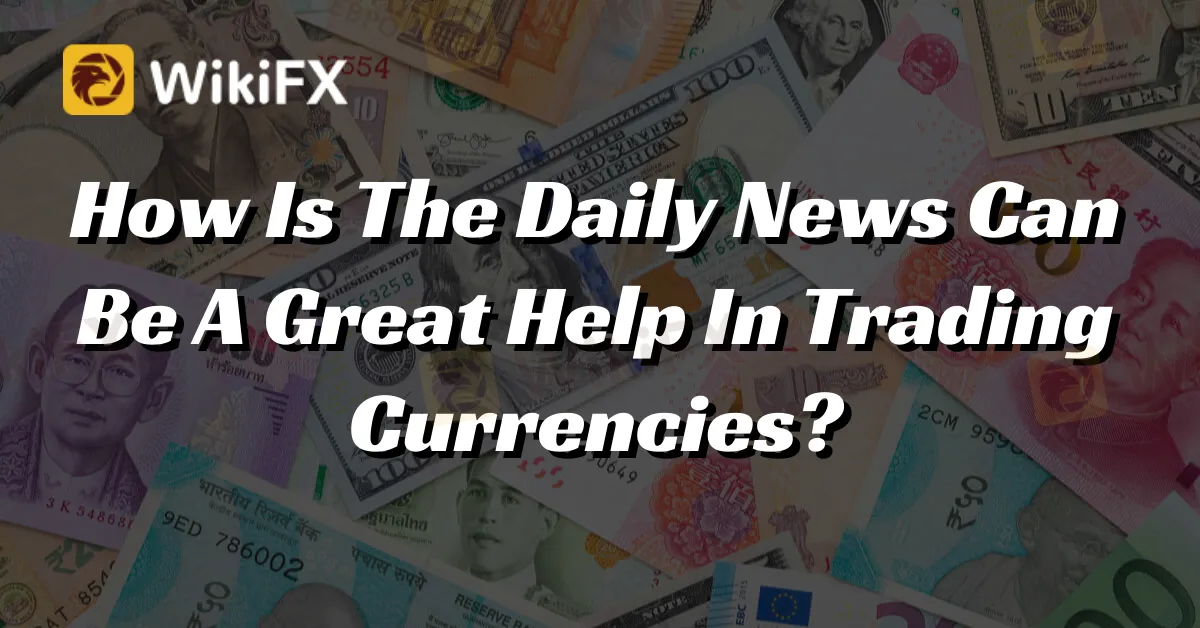简体中文
繁體中文
English
Pусский
日本語
ภาษาไทย
Tiếng Việt
Bahasa Indonesia
Español
हिन्दी
Filippiiniläinen
Français
Deutsch
Português
Türkçe
한국어
العربية
How Is The Daily News Can Be A Great Help In Trading Currencies?
Abstract:News and current events often have an influence on financial markets and may provide traders with information. For example, if a news report regarding a firm's results is better or worse than predicted, the stock price of that company may be affected. Similarly, if there is a news article on a country's economic performance or political changes, the value of that country's currency may be affected.

News and current events often have an influence on financial markets and may provide traders with information. For example, if a news report regarding a firm's results is better or worse than predicted, the stock price of that company may be affected. Similarly, if there is a news article on a country's economic performance or political changes, the value of that country's currency may be affected.
When making trading choices, traders may utilize news and current events as part of their research. It is crucial to recognize, however, that news and current events may be unexpected and may not necessarily have an obvious or enduring influence on financial markets. As a result, traders must use a range of tools and methodologies in their research rather than relying just on news and current events.
What are the variables that might cause specific currency pairings to fall?
Many variables may influence the value of a currency pair. Among the most prevalent factors are:
Economic indicators: A country's economic success may have a substantial influence on the value of its currency. For example, if a country's GDP expands, its currency may appreciate; conversely, if the economy slows or enters a slump, the currency may decrease.
Interest rates: Higher interest rates tend to attract foreign investment and strengthen currencies, whilst lower interest rates may discourage investment and weaken currencies.
Inflation: High levels of inflation may undermine a currency's buying power and cause it to lose value.
Political instability: May lead to a loss of investor confidence in a country's currency, causing its value to fall.
Natural disasters: Catastrophes, such as earthquakes or hurricanes, may impair a country's economic activities and even cause its currency to lose value.
Intervention by central banks: Central banks may sometimes purchase or sell substantial quantities of a currency in order to affect its value.
Speculation: Market speculation may also have an impact on the value of a currency. If investors anticipate that a currency will appreciate in the future, they may purchase it, causing its value to rise. If, on the other hand, investors feel that a currency will decline, they may sell it, lowering its value.
Conclusion
Traders must examine the possible risks and benefits of daily trading, as well as the need for a well-defined trading strategy and risk management plan. While news and current events might offer traders important information, it is ultimately the trader's obligation to make educated and well-reasoned trading choices based on a range of criteria.
Follow for more Forex Educational news.
Download and install the WikiFX App on your mobile phones from the download link below to stay updated on the latest news, even on the go.
Download link: https://www.wikifx.com/en/download.html

Disclaimer:
The views in this article only represent the author's personal views, and do not constitute investment advice on this platform. This platform does not guarantee the accuracy, completeness and timeliness of the information in the article, and will not be liable for any loss caused by the use of or reliance on the information in the article.
Read more

Trump vs. Powell: The Showdown That Will Shape Global Markets
The financial market is in a downturn, with Trump and the Federal Reserve each making their own calculations, while investors anxiously watch from the sidelines. Their decisions will determine the market’s direction!

U.S.-EU Trade War Escalates: What Should Investors Do?
The U.S.-EU trade war has officially begun, with escalating tariffs shaking the markets. Investors face significant challenges—how can they find opportunities amid the turmoil?

Best Binary Options Indicators: Enhance Your Trading Strategy
Binary options trading involves predicting whether an asset's price will rise or fall within a specific timeframe. Unlike traditional investing, more specifically, binary options demand rapid decisions due to fixed expiry times (e.g., 60 seconds to 1 hour). For instance, speculating if EUR/USD will be above 1.0800 in the next five minutes. Success yields a fixed payout, while failure results in the loss of invested capital. Binary indicators distill complex market data—price action, volume, volatility—into actionable signals tailored for short-term trades. Indicators act as a compass, guiding traders to trends, reversals, and optimal entry points, thus enabling traders to detect market shifts for higher-probability decisions.

Baazex Review: Is it safe to invest in it?
Baazex is a relatively new broker registered in the United Arab Emirates, with an operating history of between 2 to 5 years. Despite its claims of offering over 1500 trading instruments—from foreign exchange pairs like EUR/USD, GBP/USD, and AUD/JPY, to major stocks including Apple, Meta, Disney, LVMH, and Tesla; as well as commodities (oil, gold, silver, coffee), indices, cryptocurrencies, and futures—investors should be aware of some critical risks.
WikiFX Broker
Latest News
Indian Watchdog Approves Coinbase Registration in India
SILEGX: Is This a New Scammer on the Block?
How Can Fintech Help You Make Money?
Good News for Nigeria's Stock Market: Big Gains for Investors!
IIFL Capital Faces SEBI's Regulatory Warning
Why Is OKX Crypto Exchange Under EU Probe After Bybit $1.5B Heist?
Gold Trading Insights: Prepare for Moves Above $2,900 Post-CPI
The ‘Boom-S’ Scam: How a Simple Click Led to RM46,534 in Losses
Royal Forex’s CySEC License Revoked: Can It Still Operate Legally?
Trump vs. Powell: The Showdown That Will Shape Global Markets
Currency Calculator






